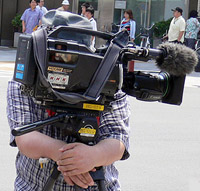Following the estimations of the international community concerning the high prices of pre-election campaign air broadcasting, the government did not wait long to answer. The answer can be divided in two parts: firstly, the president’s spokesman said that he was surprised to see complaining especially those politicians, who often go for vacation at expensive hotels in abroad, secondly, the leaders of TV companies tried to explain the reasonability of the defined prices.
To tell frankly we don’t want to discuss what Viktor Soghomonyan said since the governmental officials go to vacation more often and spend more money than the oppositionists. In fact, Mr. Soghomonyan said the same as the president had said concerning the intelligentsia (‘don’t complain!’).
The explanations of the TV companies were more interesting, which can be represented in one sentence only: “The prices are reasonable: advertisement is an expensive pleasure”. Certainly the prices are not reasonable and are higher. The Armenian TV broadcasting prices are much lower. Even there are TV companies that whole day long are showing cheap cars on their air and explaining all the details. It is clear that the price for advertising a car that costs $5.000 for about 3 minutes may not be more than $10. In a word, certainly the defined price (about $300 per minute) for campaign advertisement is too high and that decision was made purposely for political goals.
In other words, everything is normal and it is how it had to be. Everyone is doing his/her role. That is why they closed the “A1+” TV company not to allow the opposition appear on air. Why did they have to close the “A1+” if the prices were going to stay low? The leaders of TV companies are doing their job well too. That is why they are allowed to advertise alcoholic drinks so that they may obey them in the future. Also the opposition is doing its job well. Their job is to criticize and complain, which they are doing well too. In a word, everyone knows his/her job and they are doing well.
There is only one issue that is not clear yet. Why does the opposition need paid air broadcasting? It reminds me about an anecdote of the Soviet times: someone is distributing empty fliers in the street and when a policeman asks him in surprise why the fliers are quite white and empty, the guy says, “Why do I have to write everything? Everyone knows everything well already”. We think that the 60 minutes are fully enough for them since they don’t have much to say and everyone knows everything well. The French revolution was organized with three words: “Freedom, brotherhood, equity”. These words can be pronounced in 15 seconds (which costs only 20.000 AMD, included VAT). Furthermore, they don’t have to say anything since everyone knows everything well. We can imagine the bright advertisements of governmental representatives, their bright faces on the background of the Ararat mountain picture, the flag and rapid economic growth… There is another good joke too: a parrot insults a policeman and speaks slang, the policeman threatens it by saying that if the parrot speaks such bad words about him again, he will kill it, the next day the parrot and the policeman meet again, and the parrot looks at him and says: “in a word, you know what I mean”. In other words, after the advertisements of governmental representatives the oppositionists may just appear on air and say “in a word, you know what I mean”. People will understand everything.
To say more seriously, the authorities want to keep the opposition isolated and alienated by different methods such as administrative and financial tools. However, the fact is that 60 minutes are fully enough to express their minds clearly and empower their followers. The problem is that they should have anything to say, but not influence on the brains of people like the advertisements of “Vivaro Lottery”. If they need to express their minds to citizens, they can do it easily.
In other words, the main problem of the opposition is not the high prices since there are many ways how they can express their ideas.

